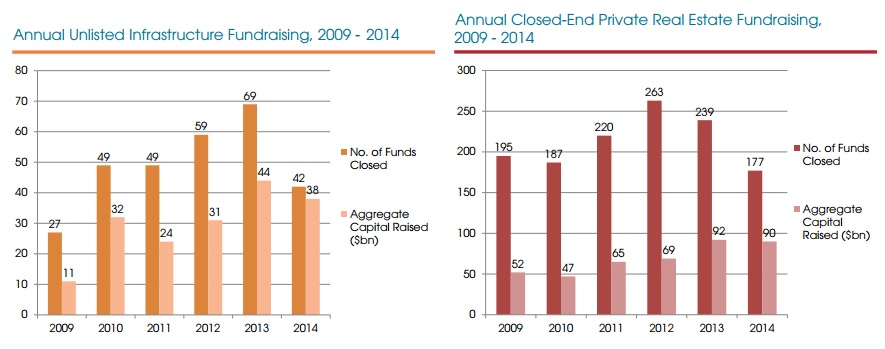Real assets funds are becoming larger as established managers increase their market dominance across the real estate and infrastructure sectors, according to data from Preqin.
Real estate funds that closed in 2014 raised $90 billion in aggregate, Preqin reported, down marginally from the sector’s 2013 total—although additional data is expected to push the total above $100 billion, the data firm said.
“While fundraising is likely to be strong in 2015, we expect that capital will continue to be concentrated into a small number of funds.” —Andrew Moylan, PreqinHowever, the assets were spread across far fewer funds: 177 real estate products closed successfully last year, compared with 239 in 2013. In 2012, 263 funds closed with $69 billion raised.
In infrastructure, the data showed a similar trend. Funds raised a total of $38 billion, down from 2013’s total of $44 billion, while the number of funds closed fell from 69 to 42.
This has pushed the size of funds up across the board, with the average real estate portfolio rising to $528 million, while infrastructure products averaged more than $1 billion for the first time since 2007.
Andrew Moylan, head of real assets products at Preqin, said fundraising was likely to remain “highly competitive” this year as investors become more discerning about the fund managers they select. This meant managers “must make a compelling investment case to attract capital”.
“Investors are becoming far more sophisticated in how they
invest in infrastructure, with many increasingly targeting direct investments
or co-investments,” Moylan added. “While fundraising is likely to be strong in
2015, we expect that capital will continue to be concentrated into a small
number of funds.” Source: Preqin
Source: Preqin
Blackstone’s Real Estate Partners Europe IV fund was the largest close in 2014, raising €6.6 billion ($7.8 billion) as demand for European assets soared. The largest infrastructure close raised $5.1 billion for the Energy Capital Partners III fund.
Related Content:The World Bank’s $1 Trillion Infrastructure Plan & Private Real Estate: More Money, More Problems?
